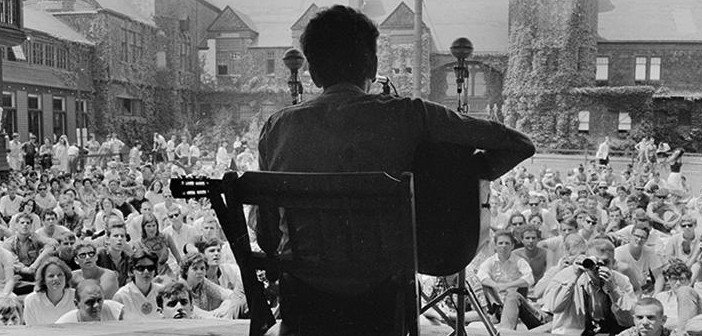Can Mumford & Sons follow in the storied footsteps of Bob Dylan?
It seems Mumford & Sons are having their ‘electric’ moment.
New album Wilder Mind comes out on May 4 minus the usual sound we are so used to hearing from them. Record number three sidelines the familiar mandolins, banjos and acoustic guitars in favour of synths, drum machines and big bad electric guitars. This musical metamorphoses brings to mind another one which occurred fifty years ago this year.
In 1965, Bob Dylan was at the height of his success but he was experiencing a musical restlessness. His first four albums defined him as the prince of the folkie scene but by the time Dylan recorded his fifth full-length effort Bringing It All Back Home, he was steadily moving away from the simplicity of the folk sound.
It may have only taken Mumford & Sons a handful of years (with a hiatus along the way) before they took their sound in a different direction, but for Dylan it was a longer process. In the Summer of 1965, armed with album number five, he sprang a sharp change on his unsuspecting followers.
On July 20, Dylan released the single ‘Like a Rolling Stone.’ It was vastly different to the usual acoustic sound Dylan was so well known for, but this was just to prepare his devotees for what was coming down the line. Five days after the release of ‘Like a Rolling Stone’, Dylan made a musically defining appearance at the Newport Folk Festival and shit truly hit the fan!
Dylan took the stage, like he did in ’63 and ’64, to greet his adoring followers but then he did something starkly different from those other appearances, he broke out a Fender Stratocaster. As Dylan played his first song ‘Maggie’s Farm’, the crowd booed at the electric performance. The booing continued into ‘Like a Rolling Stone’ and after his third number ‘Phantom Engineer’ Dylan and his band walked off stage. The likes of Ewan McColl, Paul Lomax and other folk stalwarts bitterly criticised the amplified performance. Dylan had been the darling of the folk protest scene for so long but then he revolted within the movement and staged his own protest against those he had protested alongside in the early ’60s.
Festival organisers at Newport pleaded with Dylan to return to the stage and he did. On his second turn he returned with his acoustic guitar much to the delight of the audience but he was without a harmonica. Dylan asked the audience for a harmonica and without hesitation a number of them went flying up on stage from the same crowd that just minutes before had viciously booed and called him ‘Judas’.

Dylan sang ‘Mr Tambourine Man’ and ‘It’s All Over Now Baby Blue’ before he exited the stage to the sound of ecstatic applause. It would be another 37 years before he would play at the Newport Folk Festival again. The demise of Bob Dylan , prophesied by many in the aftermath of Newport, did not materialise. 50 years after Dylan went electric and caused a stir among his fans, Mumford & Sons are today marking that anniversary by doing likewise.
The new sound penetrating from Mumford & Sons has its roots in the same thing that drove Dylan to take up the electric guitar. In the aftermath of their second album Babel the band decided to take a long break. They had been touring non stop and had worn out the mentality of their music. Dylan had the same problem back in ‘65.
While touring England that year, he was contemplating abandoning music in favour of becoming a reclusive writer of fiction. He had grown tired of the folk scene in New York and had been veering away from the left wing politics of the protest movement he had been an associated voice of, but just as he was going to abandon it all, he wrote a little ditty called ‘Like a Rolling Stone.’ When he recorded it with a rock sound, Dylan had found an alternative escape from a sound that not only had made him famous but had also drained him.
In 2013 Mumford & Sons announced they were going on hiatus, a few months later they called off the break and got back into the studio. They had a new sound they longed to experiment with and a setting to provide the perfect backdrop for it. Recorded in Brooklyn as some members settle into married life while others stagger out of break-ups, Wilder Mind is informed by these structural changes while seeking to make formative changes of its own. Will it provide a sound acceptable to their hardcore fans? Perhaps we will have to wait 50 years from now before we’ll get that definite answer.

